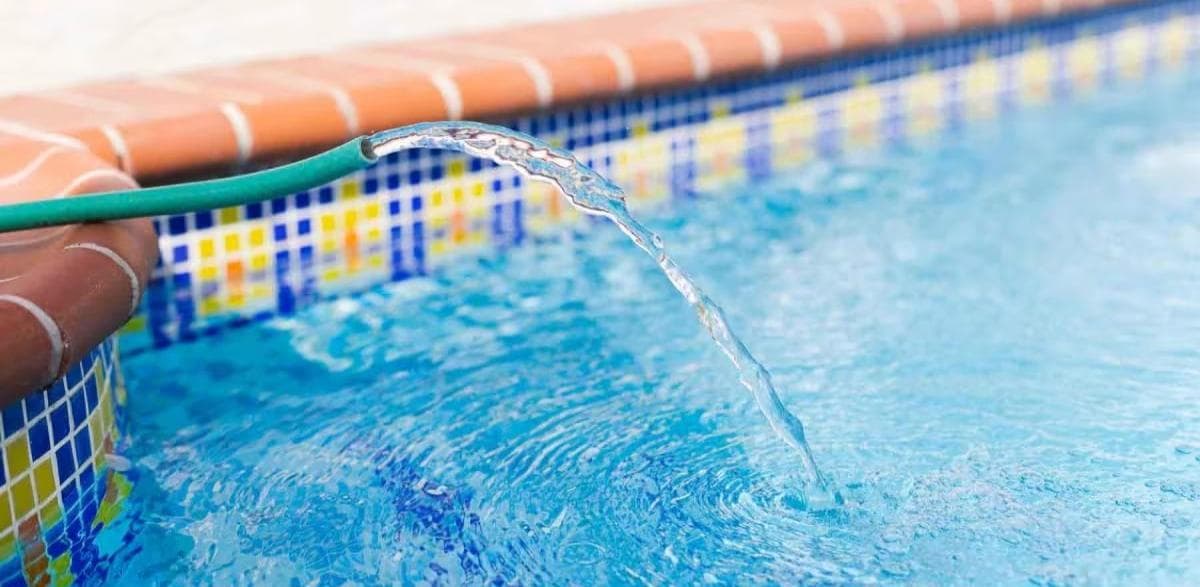What to Know When Filling a Pool With Well Water

When it comes time to fill your pool with fresh water, some homeowners may only have the option of using well water.
Wells are still widely used and a perfectly normal home water source.
While filling your pool with well water is safe and easy, some considerations should be followed. These considerations will protect your well and equipment and save you time (and potential water balance headaches!).
What to Consider Before Filling the Pool with Well Water
Whether it is a complete refill or just topping it off to counteract evaporation, three main questions should be answered before using your well water to fill up the pool:
- What contaminants or metals are present in the water?
- Can my well provide enough water for the pool (flow rate)?
- What has the weather been like the last few weeks?
Contaminants in the Water Source
Private wells pull water from deep underground in its “natural state”. Unlike municipal water, well water isn’t treated before it’s pumped.
Therefore, the water could contain various minerals and metals that could disrupt your pool maintenance. Metals like iron, copper, and manganese can stain the pool surface and clog filters and pipes.
Depending on where you are located, water can also be “hard”, or contain calcium. Too much calcium in the pool can increase calcium hardness (CH) and cause more issues.
To fully understand what is in your well water, it is very important to test it before using it to fill your pool. This will let you know exactly what the water contains.
It’s recommended to get your well water professionally tested along with using a pool test kit.
Flow Rate of Your Well
Pools need a lot of water. An average inground pool is around 15,000 to 20,000 gallons. You need to know if your well’s pump can handle that much water.
In simple terms, the flow rate determines how much water can be pumped out of the well.
While that measures the output, we will also want to know how quickly water can flow back into the well to replenish. This is known as the well recovery rate.
The last thing you want to do is run your well dry, or take more water out than it can take in. A higher flow rate (around 600 gallons per hour) should be plenty enough to comfortably fill the pool.
If you don’t know your well’s flow rate, check with a professional to get the most accurate readings.
Weather Conditions
This may seem a bit silly, but the current weather patterns should absolutely be taken into consideration if you are using a well.
If you are in a period of minimal rainfall or even a drought, it may be better to conserve that water for home use.
Also, keep in mind that neighbors could be using the same water supply, so this could affect their water use as well!
Advantages and Disadvantages of Using Well Water
Using well water to fill your pool will definitely have its benefits and drawbacks. Take these into consideration as well:
Advantages
- Cost Savings: Using water from your well is free. There are no water usage rates compared to municipal water use.
- No water shortages (with the exception to naturally-occurring water shortages): You won’t have to worry about any water restrictions or shortages that may impact supply during peak demand times. The only restrictions will come from how much water the well can pump from the ground.
- No added chemicals: Unlike municipal water sources treated with chlorine or chloramines, well water is often free from these chemicals.
Disadvantages
- Water supply: Using a lot of water can stress the well pump and the water supply in the ground near you.
- Contaminants in the water: Metals, organic matter, and other sediments can get into the water supply, ultimately landing in your pool. Ensure you know exactly what is going into your pool by testing the well water before use.
Test Before Filling!
Well water is completely fine to use when filling your pool.
But if it hasn’t been stressed enough throughout this article, I will mention it again: it is highly recommended to test the well water before filling your pool.
Testing with a pool kit is good to know for the overall chemistry balance. But it is also just as important to get it professionally tested to understand any metals or other materials that are in the water.
This gives you a good plan of action to take to mitigate any extra iron, copper, or other metal that can enter the pool.
